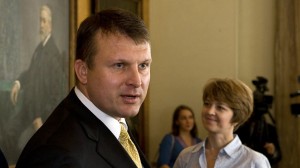
LPP/LC head and Riga Deputy Mayor Ainārs Šlesers support of the government is a reversal from his December declaration that the current government should resign.
RIGA — The pro-business Latvia’s First/Latvia’s Way union has said it would not join the government but would do all it could to support Prime Minister Valdis Dombrovskis’ Cabinet in the six months prior to national elections.
Dombrovskis had invited the party, which is led by Riga Deputy Mayor Ainars Šlesers to join the coalition, and even offered up to three ministerial posts, but the party decided to stay in the opposition. Speaking to journalists after the party’s board meeting late Monday, Šlesers said that [private_supervisor]the party was unable to agree with the government on tax issues.
Latvia’s First/Latvia’s Way, which controls 10 seats in the 100-member parliament, has become increasingly vociferous in recent months about lowering taxes and improving the business environment in the country. The party, for instance, has insisted on lowering the value-added tax for the hospitality industry from 21 to 10 percent, a proposal that Dombrovskis is skeptical about.
Šlesers did say, however, that the party would support the government in opposition all the way until the October election and would not initiate any no-confidence motions against ministers.
For his part, Dombrovskis reportedly said he was not surprised by Šlesers’ decision and that he would begin seeking candidates to fill four ministerial posts that were left vacant after the People’s Party left the coalition last month.
The People’s Party, the largest party in the Saeima, had occupied five ministries, though one ministry, for regional development, has virtually been abolished (i.e., wrapped into the economy ministry). The culture minister remained in place after leaving the People’s Party, leaving the Dombrovskis the task of filling spots for the foreign, health and justice ministries. [/private_supervisor] [private_subscription 1 month]the party was unable to agree with the government on tax issues.
Latvia’s First/Latvia’s Way, which controls 10 seats in the 100-member parliament, has become increasingly vociferous in recent months about lowering taxes and improving the business environment in the country. The party, for instance, has insisted on lowering the value-added tax for the hospitality industry from 21 to 10 percent, a proposal that Dombrovskis is skeptical about.
Šlesers did say, however, that the party would support the government in opposition all the way until the October election and would not initiate any no-confidence motions against ministers.
For his part, Dombrovskis reportedly said he was not surprised by Šlesers’ decision and that he would begin seeking candidates to fill four ministerial posts that were left vacant after the People’s Party left the coalition last month.
The People’s Party, the largest party in the Saeima, had occupied five ministries, though one ministry, for regional development, has virtually been abolished (i.e., wrapped into the economy ministry). The culture minister remained in place after leaving the People’s Party, leaving the Dombrovskis the task of filling spots for the foreign, health and justice ministries. [/private_subscription 1 month] [private_subscription 4 months]the party was unable to agree with the government on tax issues.
Latvia’s First/Latvia’s Way, which controls 10 seats in the 100-member parliament, has become increasingly vociferous in recent months about lowering taxes and improving the business environment in the country. The party, for instance, has insisted on lowering the value-added tax for the hospitality industry from 21 to 10 percent, a proposal that Dombrovskis is skeptical about.
Šlesers did say, however, that the party would support the government in opposition all the way until the October election and would not initiate any no-confidence motions against ministers.
For his part, Dombrovskis reportedly said he was not surprised by Šlesers’ decision and that he would begin seeking candidates to fill four ministerial posts that were left vacant after the People’s Party left the coalition last month.
The People’s Party, the largest party in the Saeima, had occupied five ministries, though one ministry, for regional development, has virtually been abolished (i.e., wrapped into the economy ministry). The culture minister remained in place after leaving the People’s Party, leaving the Dombrovskis the task of filling spots for the foreign, health and justice ministries. [/private_subscription 4 months] [private_subscription 1 year]the party was unable to agree with the government on tax issues.
Latvia’s First/Latvia’s Way, which controls 10 seats in the 100-member parliament, has become increasingly vociferous in recent months about lowering taxes and improving the business environment in the country. The party, for instance, has insisted on lowering the value-added tax for the hospitality industry from 21 to 10 percent, a proposal that Dombrovskis is skeptical about.
Šlesers did say, however, that the party would support the government in opposition all the way until the October election and would not initiate any no-confidence motions against ministers.
For his part, Dombrovskis reportedly said he was not surprised by Šlesers’ decision and that he would begin seeking candidates to fill four ministerial posts that were left vacant after the People’s Party left the coalition last month.
The People’s Party, the largest party in the Saeima, had occupied five ministries, though one ministry, for regional development, has virtually been abolished (i.e., wrapped into the economy ministry). The culture minister remained in place after leaving the People’s Party, leaving the Dombrovskis the task of filling spots for the foreign, health and justice ministries. [/private_subscription 1 year]
— This is a paid article. To subscribe or extend your subscription, click here.












